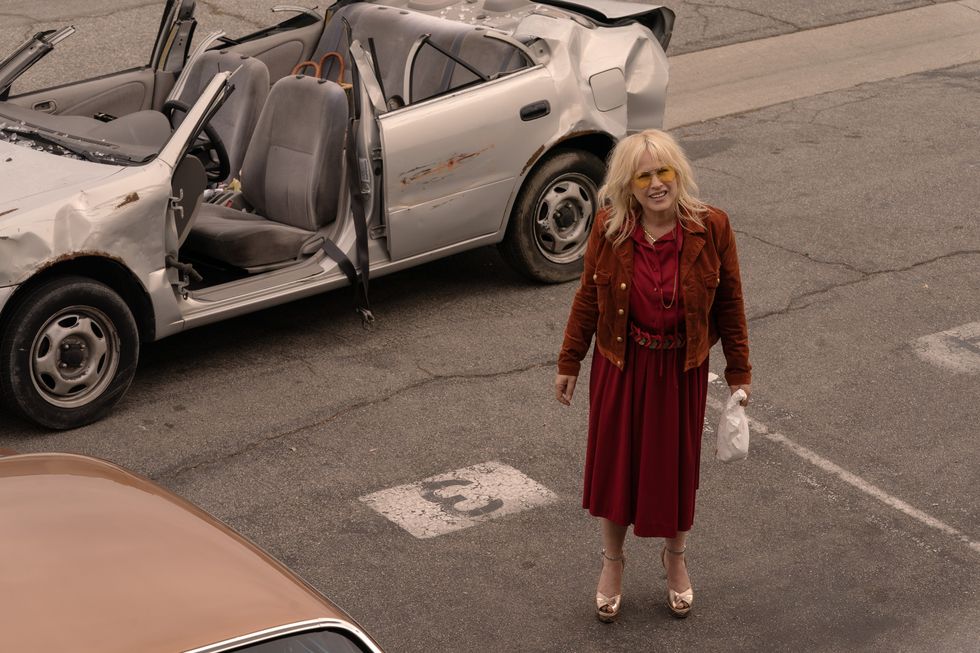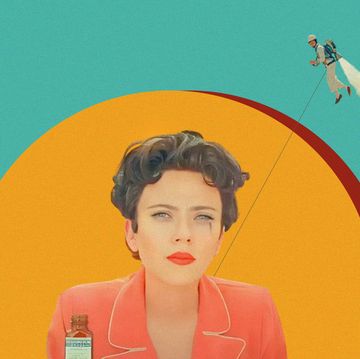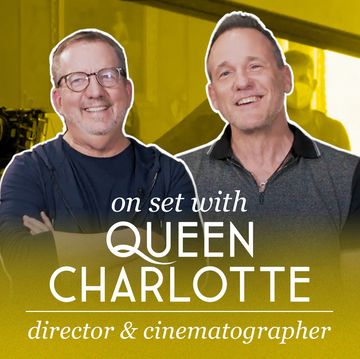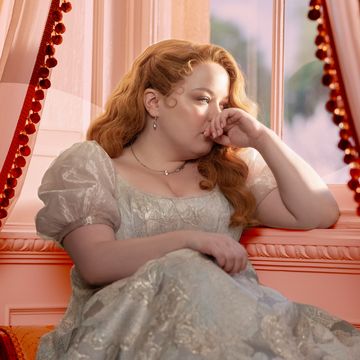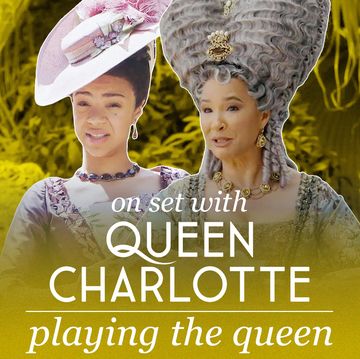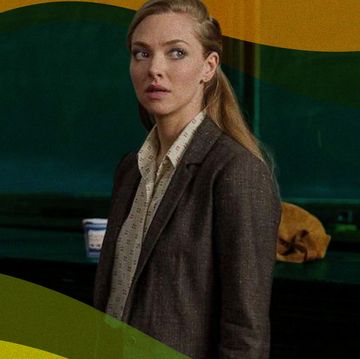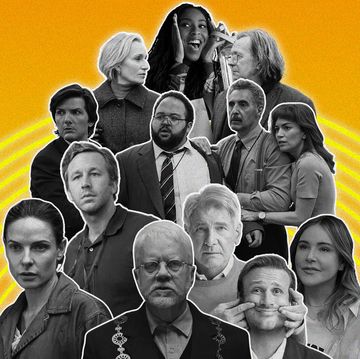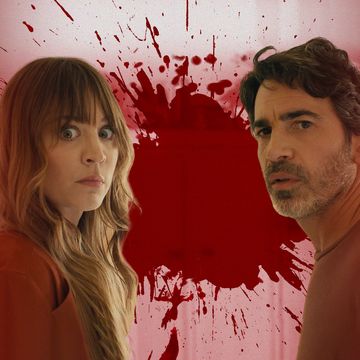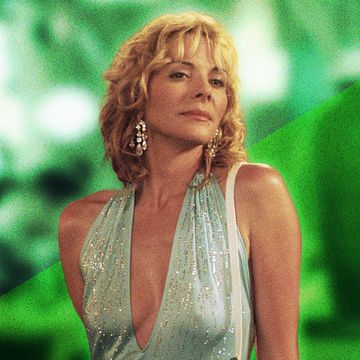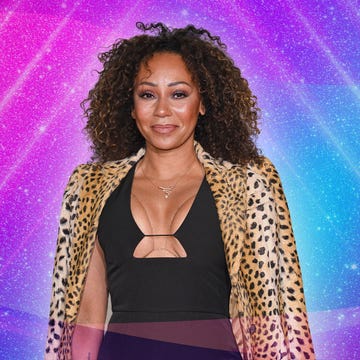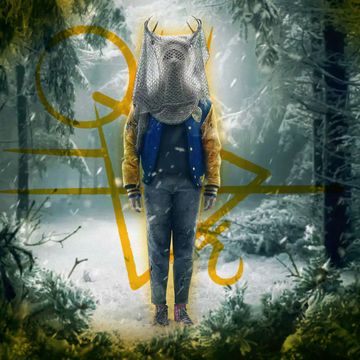Even in a brief conversation, one gets the sense that, to Patricia Arquette, her many accolades — numerous Emmy, Oscar, Golden Globe, BAFTA, Critics’ Choice, and Screen Actors Guild nominations and awards for such work as psychic Allison DuBois in Medium, the poisonous mother Dee Dee Blanchard in The Act, Joyce Mitchell in Escape at Dannemora, and a 12-year role as the divorced single mother Olivia Evans in Richard Linklater’s Boyhood — are merely a wonderful byproduct of doing meaningful work. What she really feels for the progress she’s seen as an actor through the years is, simply, gratitude.
“I’m just really lucky to be living at this time,” Arquette tells Shondaland. “To be a 55-year-old actress in the old days, you really didn’t have very many options, so I’m very happy that there’s more opportunities now than there were before. Having said that, also, when you’re younger, a lot of the parts that you get, especially back then, were really all around the male. You were the object of desire, or you were the bad object of desire, the bad girl, or you were the dream object of desire, the sweet girl. It really was secondary to the male lead and their journey, so I think in aging, that’s changed a lot.” When it comes to choosing among this new wealth of roles, Arquette leads with instinct: “I really just go from my gut. I look for some good things that are original that resonate for me in some way and have something interesting for me to play. This is good because of x, y, z, or this really scares me, so maybe I should do it.”
Such a role is Peggy Newman in High Desert, an Apple TV+ show she also executive produced (along with her director on Severance, Ben Stiller) that took “many, many years” to make. A somewhat physical, pulse-raiser of a role, Peggy is a struggling addict grieving the fresh loss of her mother who falls ass-backward into a wild life-or-death caper. Arquette got involved with the project when writers Nancy Fichman, Katie Ford, and Jennifer Hoppe-House approached her with the script. “It’s very different than it is now, but the humor was there — it just made me laugh a lot,” Arquette says. “They have a very sardonic, off-kilter sense of humor that I think I share, and it’s not that common in a lot of comedies that you see, but I really loved their voice.”
The current iteration of High Desert has grown from its seeds. “We worked on changing the script a bit, and then we brought in Ben Stiller, who is one of our producers, and attached him,” Arquette continues. “I totally love and value his opinion. It was nice to have him there to run ideas by, get suggestions, edit ideas, and so on. Then we got [director] Jay Roach, which was a blessing, and we went out and pitched it all around.”
When it came time to shoot High Desert, Arquette arrived on set fresh from the surrealistically austere environs of Severance, Apple TV+’s zeitgeisty workplace dark comedy that’s proved a hit with critics and viewers alike. As the premise of Severance involves assuming different identities in and out of work, Arquette’s dual roles on Severance — Harmony Cobel and Mrs. Selvig — form a rather stark contrast to the freewheeling antics of Peggy Newman, who is as untamed as the California desert. “They were kind of back-to-back,” Arquette explains. “I got to go from Cobel and Lumon [the fictional company where they all work], which is such a kind of claustrophobic environment — and how structured everything is, and how disciplined that world is and that character is — to this kind of wild wildebeest of a human.”
From the very first scene of High Desert, it’s clear the “wildebeest” Arquette brings to life is indeed a mayhem magnet who gives chase to bad guys like a multidimensional antihero for the ages — a role that, not long ago, was a rare opportunity for a female actor in her mid-50s. “I think we’re just kind of in the infancy of these opportunities of different stories,” Arquette says when asked if things have improved for women in terms of ageism. “I do hear, and I think it’s certainly not of my work, a lot more people are working very hard to try to change things for our industry, and I think that it’s been really nice to see some headway made about that. There’s still a long way to go.”
It’s a well-known fact that acting is in Arquette’s blood, so she knows a thing or two about how the industry has and has not changed. To break it all down briefly: Her grandfather, Cliff Arquette, a comedian, appeared on The Tonight Show. Her father, Lewis Arquette, was a working actor who did a lot of commercials and had a part on the ’70s TV show The Waltons. Her mother was a poet, acting teacher, and therapist, and her family spent a few years on a commune in Virginia. She’s one of five: Arquette’s older sister, Rosanna, has starred in numerous films, including Desperately Seeking Susan with Madonna, and is the Rosanna that Toto sang about. Her younger brother, David, we all know from the Scream franchise and his marriage to Courteney Cox; her older brother, Richmond, is also an actor and writer who appeared in 2007’s Zodiac and The Curious Case of Benjamin Button. Arquette’s late sister, Alexis, was a trans actress who appeared in numerous films and TV shows, including The Wedding Singer, Californication, and Friends, often in drag roles. Patricia and her siblings had a sense of clarity about what show business was really like. “My dad had struggled a lot also as a working actor,” says Arquette. “We saw in real time how hard it was to get work and how frustrating it was, and how many auditions you have to go on to ever get a job, you know?”
Arquette’s big break was in 1987 with a part in Nightmare on Elm Street 3: Dream Warriors, followed by breakout roles in the films True Romance, Tim Burton’s Ed Wood, and David Lynch’s Lost Highway. Mindful of the changes she’s seen, she’s grateful to have come from a time before digital auditioning, something she regards as a pervasive new challenge for young actors. “In the old days, I would go into an audition, and they might pair me with another young actor who happened to be Brad Pitt when he was a kid, or Johnny Depp, or somebody,” she explains. “We were all in the casting rooms, so I got to read with other actors, or the casting director would bring in an actor for me to read with. Now, all these kids have to self-tape. They have no direction from the casting director or from a director; they’re just sending in these tapes, and it’s not an ideal way to work for an actor. You’re not able to change your performance according to what somebody else is doing and find all the nuances. I do feel that I also came up at a very good time, just for the experience of what it is between a casting director and an actor, and to grow as a young actor. I don’t feel these young people are getting that.”
Arquette describes playing Peggy in High Desert as a good time, as exhausting as it was. “It was kind of like a cyclone that’s constantly moving,” Arquette says. “Jay Roach, our director, described Peggy as a rock and roll hummingbird. She’s just constantly going, and it’s part of her way of distracting herself from herself and the circumstances that she’s in. It’s constantly being on the move, always five places at once, thinking about five different things, and certainly how she can use any circumstance to her greatest advantage.”
Arquette was initially attracted to the idea of playing Peggy because, with all her faults, she was portrayed “in a funny, loving way,” she says. “I’ve known people like that in my life. They were always kind of creating a cyclone around them of dysfunction and chaos. There’s always a lot of broken birds in those scenarios, but they’re trying to rescue even though they’re a disaster themselves. I loved all of that. I loved how she was interested in all these different things and kind of believed in herself despite her family and probably the world not really believing much in her at moments.”
High Desert assumes a more empathetic approach that is often missing in flattering or humorous depictions of those struggling with addiction and grief. Arquette says about Peggy, “She’s going through a lot of grief and loss and feels very lonely, and yet she keeps trying to pick herself up by her bootstraps despite this flaw that she has, which is always to escape whatever it is around her. But she does have these skill sets, and she does help a lot of people, as many as she can, along her way, even though she can barely keep it together for herself. They talk about this thing with addicts sometimes — there’s the addict, and there’s the partner or the family of the addict. Sometimes there are people who are ‘double winners,’ they call them, so they’re an addict, but they also have codependent tendencies, and I think that’s kind of where Peggy lands.”
Such a sympathetic take on a character like Peggy perfectly aligns with Arquette’s activism. She’s known for using her award acceptance speeches, for instance, to advocate for others. In 2015, when accepting the Best Supporting Actress Oscar for her role in Boyhood, she urged her fellow women to demand equal pay. During her acceptance speech for winning SAG’s Outstanding Performance by a Female Actor for Escape at Dannemora, she encouraged actors to take pictures of their call sheets so they get paid for overtime. After the loss of her sister Alexis in 2016, she implored the audience to give trans people jobs during her Outstanding Supporting Actress Emmy Award acceptance speech for The Act in 2019.
With all of the anti-LGBTQI+ laws coming into play in this country, I ask how we can best advocate for our trans friends and family. “That’s my question too,” she says. “I’m shocked by what’s happening in America, but there’s another part of me that’s not shocked by what’s happening in America. I feel sick to my stomach when I see what’s happening. It’s like Americans have completely lost their goodwill to each other and their ability to care about each other as human beings. It seems like trans people have just become this political target that people are infuriated about, and they’re not hurting anybody! They’re not changing anything in America, or hurting each other, or hurting innocent people, or hurting innocent families, and they’re taking away trans people’s basic civil rights. It’s really dangerous, especially for our youth. They have the highest suicide rates among kids — why are we doing this? This is not how people who love each other and treat each other with respect behave. It’s a nightmare.” She feels voting is more important than ever. “Get out, and vote people out who take away trans people’s dignity and human rights and dehumanize them. That’s the No. 1 thing we can do,” she says. “Vote for candidates who will do something.”
Vivian Manning-Schaffel is a multifaceted storyteller whose work has been featured in The Cut, NBC News Better, Time Out New York, Medium, and The Week. Follow her on Twitter @soapboxdirty.
Get Shondaland directly in your inbox: SUBSCRIBE TODAY


